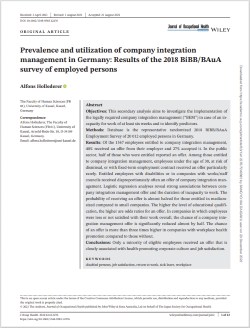#0137 Prevalence and utilization of company integration management in Germany: Results of the 2018 BiBB/BAuA survey of employed persons

Return to Work: Reviewing the Implementation of Company Integration Management Program
People who have been sick repeatedly or for an extended period may find it difficult to return to work. This also applies to people who are unable to work for an extended period due to a disability. Returning to work is often more effective when the employer actively supports them through flexible working hours, technical aids, or other health-promoting measures.
Therefore, in Germany, a special procedure was introduced in 2004 requiring all employers to offer a special program, "company integration management" (or Betriebliches Eingliederungsmanagement [BEM]), to employees who had been absent due to sickness for more than six weeks in the past twelve months. The objectives of this program are to avoid future (long-term) absenteeism, promote workplace health and rehabilitation, and ensure that the employee can stay at work. However, despite legislative requirements, the execution of this return-to-work program in German firms remains insufficient.
Now, a German researcher has conducted a study on the implementation of the company integration management program. The study used data from the 2018 BIBB/BAuA Employment Survey of 20,012 employees in Germany. According to the study, only 40% of the 1,367 eligible employees received a return-to-work offer from their company, with nearly two-thirds accepting it. Even in the public sector, only about half of the eligible employees received an offer. In addition, the odds of an offer are nearly halved in organizations where employees are dissatisfied with their work in general.
On the other hand, eligible employees with disabilities or those working in organizations with staff councils were more likely to receive an offer. Interestingly, more employees in smaller companies reported an offer than those in mid-sized companies. This may be due to the intimate social relationship that exists between the employer and the employee in small businesses. Moreover, the chances of a company integration management offer increase with the educational qualification level. The prevalence of workplace health promotion is also connected with a threefold increase in the likelihood of receiving an offer. This is because company integration management tends to be better implemented into the organization's existing preventive culture.
In summary, this program not only benefits employees but also helps employers retain talent. Despite the benefits, only a small proportion of eligible employees received a company integration management offer. As a result, more research is needed to ensure that such legally mandated programs are implemented in all companies.

Link to original journal article:
https://academic.oup.com/joh/article/63/1/e12276/7249880
Title of the paper:
Prevalence and utilization of company integration management in Germany: Results of the 2018 BiBB/BAuA survey of employed persons
Authors:
Alfons Hollederer




